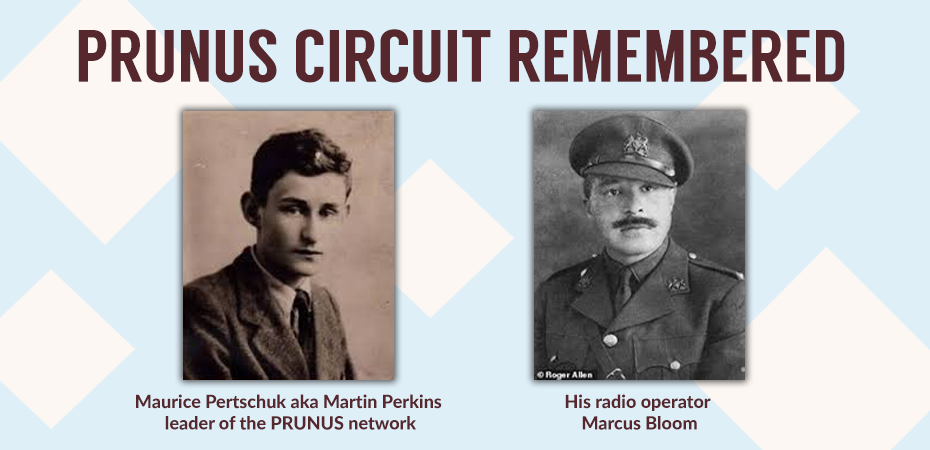PRUNUS Circuit Remembered
7th December 2024
The following is adapted from a report I wrote which appeared in the Secret WW2 Learning Network’s quarterly newsletter published in November.
Earlier that month. Anne Whiteside, whom I met through an online forum, travelled from America with her husband and friends to Toulouse.
There she would give a talk at the prestigious Hôtel d’Assézat about her uncle Maurice Pertschuk aka Martin Perkins leader of the PRUNUS network. Moreover the following day the local Musée de la Résistance et de la Déportation was to dedicate various events to the commemoration of the work of this and other local networks. I was fortunate enough to be able to attend, keen to meet Anne and to learn more.
My interest sprang from a deeply-held conviction that neither Pertschuk nor his equally ill-fated radio operator Marcus Bloom had ever been given their due by historians. Apart from his SOE/ Resistance work Maurice Pertschuk was an exceptional young man most renowned perhaps for his lyrical poetry written secretly during his time at Buchenwald. Marcus Bloom was represented by two of his nephews Tony and Terry who are not alone in wondering why the two SOE agents have been so badly served by historians over the years.
Hopefully Anne’s eagerly-awaited biography of her uncle ‘The moon in splinters’ (title drawn from one of his exquisite poems) will do much to redress this.
The PRUNUS network has similarly been overlooked. Yet before the capture of its key personnel and its dismantling, numbered 175 agents, spread across 7 ‘Départements’. 150 of these agents later joined the WHEELWRIGHT network which was to play such a major rôle come the Liberation. The collapse of PRUNUS was the handiwork of Abwehr agent Robert Moog. An instance of infiltration and entrapment not carelessness or lapses in security as have been attributed to them.
The contributions from other speakers revealed what a hotbed of Resistance Toulouse had been. Astonishing to hear of the vast numbers of Spanish Republicans involved. The excellent guided walking tour of the area highlighting some of the safehouses (including in Rue des Pyrénées where Pertschuk and others were arrested) and the mansion used for initial and brutal interrogations was fascinating and of course emotive.
I was so grateful for the opportunity to meet Anne in person to congratulate her on her diligent and painstaking research into her uncle’s life and achievements. These publications bring to life the remarkable men (and women) of the SOE and Resistance (and more recently the SIS) and their authors deserve our support. I know Anne’s book will be well-received when published next year. I have had a sneak preview of her manuscript and I found it (inevitably) extremely moving. It is to be hoped the slim volume of his poetry, such a precious artefact, can also be re-published as it is out of print and copies virtually impossible to find. Without it, young Maurice’s story is in my opinion, incomplete.
I learned a lot from the talks although there were so many unfamiliar names flying about that at times I struggled to keep up. One insight I took away: I have often bemoaned the fact that there has been so little recognition of the British contribution to the work of the French Resistance. (Which dates back to de Gaulle’s expulsion of our agents the moment he set foot in France after D-Day.) The talks I attended in Toulouse revealed an even sadder truth: the French Resistance has equally been long-neglected in France.
These events and the work done by Paul McCue and the Secret WW2 Learning Network are crucial to the securing for future generations of an appreciation of the courage and sacrifice of those brave souls. Including those who survived against the odds, scarred mentally and often physically, by their experiences. Anne’s book also captures and reflects on, the impact on family members when one of these agents was captured, destined to disappear from their lives.